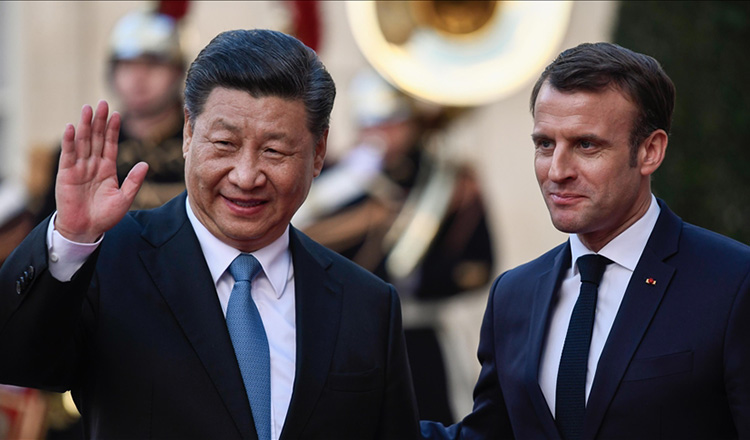
French President Emmanuel Macron’s visit to China and his comments about not following the United States (US) reflect Europe’s multifaceted and pragmatic approach to Beijing while the US hopes to rally its partners behind containing Beijing and deterring it from invading Taiwan. Joined by EU Commission chief Ursula von der Leyen and several business delegates, Macron penned various deals between Paris and Beijing in several sectors. One of the biggest deals was a new assembly line in French aircraft manufacturer Airbus’ Tianjin factory so the company can double its production capacity of A320 models.
France evidently seeks greater autonomy, wherein it has adapted to China’s growing economic and diplomatic clout in recent years. Indeed, Macron has also promoted the idea that Europe should not be a “vassal” of the US and act independently. While there are some practical realities over Europe balancing ties with the US and China, much of Macron’s words are ideological and driven by his own present concerns. Macron has faced various domestic challenges, including mass protests over pension reform. In the past, Macron has invoked the concept of leading a unified Europe to secure his popular support, such as before the 2022 Presidential elections. Moreover, Macron has often exploited narratives of historic post-war leader Charles de Gaulle that Paris should not inherently follow the US, which has been seen as a concept of French stability to unify its people. So, there is a mixture of pragmatism towards China yet with Macron also engaging in his own political posturing.
How might Washington react to Macron’s stance?
Macron’s visions of aiming to create the EU as a “third superpower”, which France would apparently, to challenge the duopoly between the US and China could certainly cause friction with Washington. After all, Macron explicitly stated Paris would currently not intervene if China invaded Taiwan. Due to Washington’s concerns on an invasion and the global economic implications of targeting an important industrial hub, this is likely to anger the US.
On the other hand, France has previously felt that ties within the US-led framework in the Indo-Pacific are crucial. It has sought to work with US partners like India and Japan, who also fear China’s militarization in Indo-Pacific. Like Germany and the Netherlands, France has also deployed its navy in the region with the stated aim of protecting maritime trade and security.
Yet, as a resident power, Paris has more vested interests in Asia-Pacific, as 7 of its 13 overseas territories are there. But as a Europe-based middle power rather than a global one, France can only play a limited role in regional security and would still, therefore, need to collaborate with the US. A key objective of Macron was to gain support from China in swaying Russia into ending the war in Ukraine, showing that while it plays a role in Indo-Pacific, for Europe the Russia-Ukraine war is a priority as opposed to Taiwan and China’s militarization. This could forge a delineation where Washington focuses on Indo-Pacific, while the EU states prioritize Ukraine.
Can Europe act autonomously over China?
Macron alone cannot organize a unified Europe. Member states are noticeably divided on ties with the US and China. For instance, the Netherlands in contrast has followed the US’ position of pursuing decoupling from Chinese technology like semiconductors. Meanwhile, Poland declared its full support for the US’ security partnership, with Defense Minister Mariusz Blaszczak announcing Warsaw is bolstering its military amid security risks from the Russia-Ukraine war. Given the timing and contradiction with Macron’s words, it was evidently a rebuttal of the French president.
Even with the visit, von der Leyen warned the EU should continue protecting its own trade interests without becoming too dependent on China. Some MEPs even stated that France does not speak for all of Europe. At the same time, Germany has expressed its support for deepening trade with China, particularly to offset the continent’s current economic crisis since the Russia-Ukraine war.
As a result, the EU itself is divided by its member states’ wishes. This restricts its capabilities to act as an effective foreign policy entity. Even though the EU bloc promotes free trade in Asia-Pacific and only challenges China on human rights, individual states would keep benefitting from ties with the US while others to varying degrees would accommodate China’s rise. Ultimately, however, China has managed to split a prospective Western alliance against itself, namely through its economic influence. It is also evident that what US officials have perceived as a battle between the “liberal world order” and its “authoritarian adversaries” is not clear-cut. First published in Anadolu Agency






